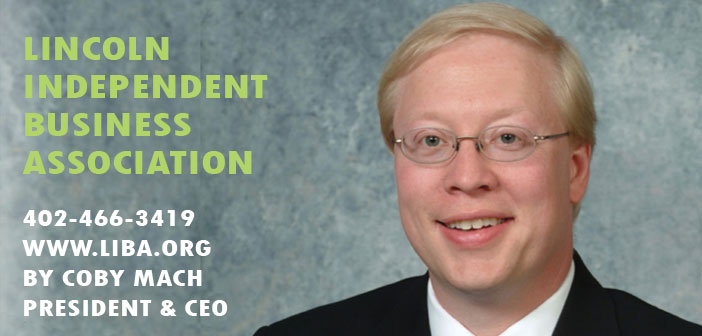2016 Legislative Priorities
Every year, the Lincoln Independent Business Association (LIBA; www.liba.org) sets a list of priorities for the coming year. Here are some things that we will be working on with our State Senators in 2016:
Eliminate the Personal Property Tax on Nebraska Businesses. The Legislature’s efforts last year to reduce the personal property tax were a big first step. The implementation of LB 259’s reduction will result in an average of $162 in savings per personal property tax payer. But the complete elimination of the personal property tax is the important end goal. Nebraska businesses paid more than $217 million in personal property taxes. The personal property tax not only costs businesses financially, but it is also very costly in terms of the time and effort necessary to complete and file the appropriate tax returns. Many states do not impose any tax on personal property, including Iowa, South Dakota, North Dakota, and Minnesota. Experts report that there has been a national trend to shift away from personal property taxes, including states like Kansas and Maine that are working to phase their personal property tax out.
Protect Nebraska Public Entities from Unnecessary Penalties in the Affordable Care Act. As of 2018, employers (including public entities) that provide “Cadillac” health insurance plans will be required to pay a punitive tax to the federal government. In real terms, for example, the City of Lincoln has projected the punitive “Cadillac Tax” will result in a health insurance penalty to the city of more than $700,000 per year. The Nebraska legislature must address this major threat to public finances by adopting some statutory provision that prohibits public entities from providing health insurance benefits that will result in taxpayer dollars being used to pay a punitive tax to the federal government.
Utilize ACT Testing to Better Assess the College Readiness of Nebraska High School Juniors. Nebraska students are currently administered the NeSA test as juniors in high school. Administering tests to measure academic progress can be extremely helpful if done properly and effectively. The ACT provides a broad exam that is ubiquitously recognized as a way of measuring educational attainment and college readiness. Because of the widespread understanding of what a score on the ACT means, ACT scores provide a solid metric for assessing our education system. Because of a pilot program, we are now able to report that the average ACT score for LPS students of 20.7 is lower than the national average score of 21.0, but the LPS college readiness rating of 29 percent is higher than the national average rating of 28 percent. We can also make a quick comparison of LPS to private schools and know that the LPS marks are both lower than the Lincoln Pius X average score of 24.3 and college readiness rating of 45 percent. If Nebraska high school juniors throughout the state were given the ACT exam in place of the NeSA exam we could better measure the college readiness of Nebraska students and determine how our educational efforts match up with other states.
Adjust the State Aid Formula to Avoid Penalizing Schools for Reducing Their Levy. The formula which determines the amount of state aid Nebraska school districts are eligible to receive provides an incentive for school districts to maintain a maximum property tax levy, even in years in which property tax relief might be possible. For example, using the current TEEOSA formula, were Lincoln Public Schools to levy at less than the statutory maximum, state aid funding in future years would be jeopardized. LPS officials have told us that even a minor reduction in the LPS levy from $1.05 to $1.035 – a one-and-a-half-cent reduction – would result in a loss of about $325,000 in state aid. Providing districts with leeway to reduce their levy without the threat of lost funding would benefit tax payers, and LIBA asks that our legislators consider such a proposal to help address the serious issue of statewide property tax relief.
LIBA studies and promotes these types of issues that are important to businesses and our community. If you have an interest in joining LIBA, please call me at (402) 466-3419. LIBA membership is not restricted to just businesses. We also have “individual” memberships for those who want to help influence our local government decisions. You will also find more information about Lincoln Independent Business Association by visiting our web site www.liba.org.

